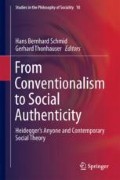Abstract
To address the question of the nature and function of conventions, this essay explores a possible systematic link between Heidegger’s hermeneutical phenomenology and Foucault’s historical ontology. It argues that these analyses establish, contra to the cognitivist interpretation, dominant then and now, that conventions are properly understood not as “common knowledge” (Lewis) nor even as “jointly accepted beliefs” (Gilbert)—that they are not, at least at their most fundamental layer, cognitive states at all—but are instead (individual and social) bodily dispositions that are forged by historically shifting entwinements of practices of power and forms of knowledge.
Access this chapter
Tax calculation will be finalised at checkout
Purchases are for personal use only
Notes
- 1.
Note that both treatments follow the tradition exemplified by Hume and accord preference and belief, whether held singularly or jointly, a fundamental role in explaining what a convention is or better, for Lewis in particular but Gilbert shares this descriptive orientation as well, how such patterns function in everyday behavior. It is this aspect that I refer to as being cognitivist. In this respect, I take Raimo Tuomela’s account of sociality in terms of we-mode intentionality to be but a variation, though more game theoretic, on Gilbert’s basic analysis. See his most recent statement of his theory in Tuomela (2013).
- 2.
Please note that while I have generally followed the English translation of Sein und Zeit by Macquarie and Robinson, I have altered it without notice where I believe a different formulation better captures the sense of the German.
- 3.
- 4.
Heidegger appears to concede this kind of reading is possible given that the analyses in Sein und Zeit, though they seek to render the provenance of the metaphysical tradition questionable, are still cast in a conceptual framework that remains tied to this tradition and thus equates existence with actuality. See Heidegger (1967: esp. 322–328).
- 5.
- 6.
I leave aside here the question of how far the implications of this historico-temporalization of das Man goes. Specifically, I do not address here the question of whether or not the turn to historicity entails the complete abandonment of the existential structure of Dasein itself or whether it is retained as a general, abiding structure that simply varies historically. Rather, in what follows, I take it that treating Dasein as a goal, as a possibility, is a claim that arises only with what Heidegger called the closure of metaphysics and the turning from this epochal formation to something other and I turn to Foucault to explore what concretely this possibility has meant in this epochal shift.
References
Carman, T. (1994). On being social: A reply to Olafson. Inquiry, 37(2), 203–223.
Dreyfus, H. L. (1995). Interpreting Heidegger on Das Man. Inquiry, 38(4), 423–430.
Foucault, M. (1966). Les mots et les choses. Paris: Gallimard.
Foucault, M. (1975). Surveiller et punir. Paris: Gallimard.
Foucault, M. (1976). La volonté de savoir. Paris: Gallimard.
Foucault, M. (1997). “Il faut défendre la société.” Cours au Collège de France. 1976. Paris: Seuil/Gallimard.
Foucault, M. (2004). Sécurité, territoire, population. Cours au Collège de France. 1977–1978. Paris: Seuil/Gallimard.
Gilbert, M. (2014). Social convention revisited. In Joint Commitment (pp. 207–228). Oxford: Oxford University Press.
Haugeland, J. (2013). Heidegger on being a person. In Dasein Disclosed: John Haugeland’s Heidegger (pp. 3–16). Cambridge, MA: Harvard University Press.
Heidegger, M. (1967). Brief über den ‘Humanismus’. In Wegmarken (pp. 313–364). Vittorio Klostermann: Frankfurt am Main.
Heidegger, M. (1972). Sein und Zeit. Stuttgart: Niemeyer.
Heidegger, M. (1989). Beiträge zur Philosophie (Vom Ereignis), Gesamtausgabe Band 65. Frankfurt am Main: Vittorio Klostermann.
Heidegger, M. (2009). Das Ereignis, Gesamtausgabe 71. Frankfurt am Main: Vittorio Klostermann.
Hume, D. (1975). A treatise of human nature. Oxford: Clarendon Press.
Jacob, F. (1970). La logique du vivant. Paris: Gallimard.
Lewis, D. (1969). Convention: A philosophical study. Cambridge, MA: Harvard University Press.
Olafson, F. (1994a). Heidegger à la Wittgenstein or ‘coping’ with Professor Dreyfus. Inquiry, 37(1), 45–64.
Olafson, F. (1994b). Individualism, subjectivity, and presence: A response to Taylor Carman. Inquiry, 37(3), 331–337.
Tuomela, R. (2013). Social ontology: Collective intentionality and group agents. Oxford: Oxford University Press.
Acknowledgments
I want to thank the anonymous reviewer for this volume for their comments on an earlier draft of this essay.
Author information
Authors and Affiliations
Corresponding author
Editor information
Editors and Affiliations
Rights and permissions
Copyright information
© 2017 Springer International Publishing AG
About this chapter
Cite this chapter
Thompson, K. (2017). The Historicality of das Man: Foucault on Docility and Optimality. In: Schmid, H., Thonhauser, G. (eds) From Conventionalism to Social Authenticity. Studies in the Philosophy of Sociality, vol 10. Springer, Cham. https://doi.org/10.1007/978-3-319-56865-2_6
Download citation
DOI: https://doi.org/10.1007/978-3-319-56865-2_6
Published:
Publisher Name: Springer, Cham
Print ISBN: 978-3-319-56864-5
Online ISBN: 978-3-319-56865-2
eBook Packages: Religion and PhilosophyPhilosophy and Religion (R0)

